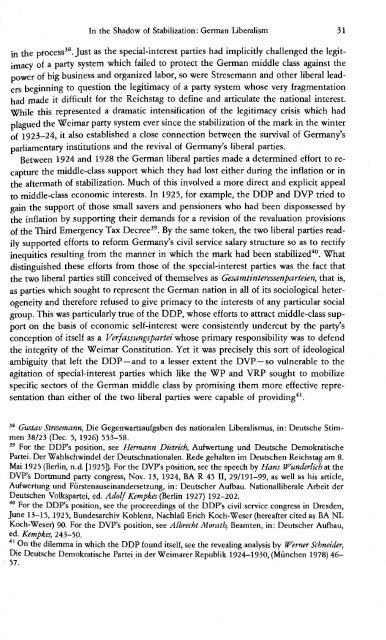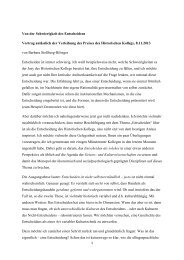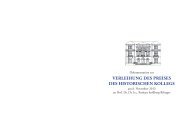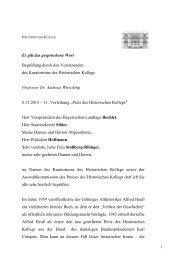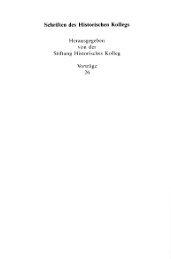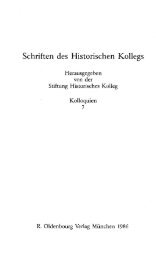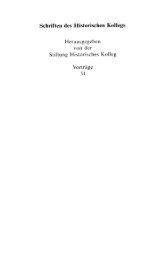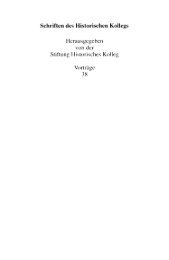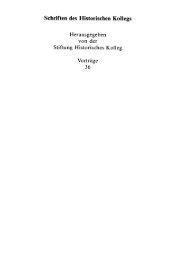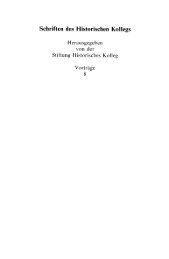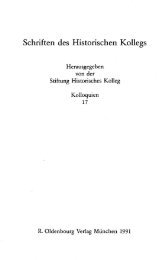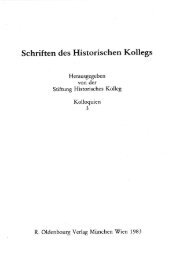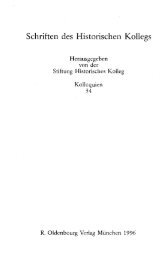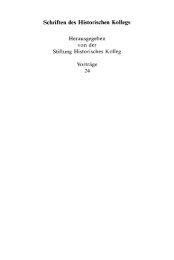Schriften des Historischen Kollegs - Kolloquien 6 - Historisches Kolleg
Schriften des Historischen Kollegs - Kolloquien 6 - Historisches Kolleg
Schriften des Historischen Kollegs - Kolloquien 6 - Historisches Kolleg
Erfolgreiche ePaper selbst erstellen
Machen Sie aus Ihren PDF Publikationen ein blätterbares Flipbook mit unserer einzigartigen Google optimierten e-Paper Software.
In the Shadow of Stabilization: Gennan Liberalism 31<br />
in the process 38 • Just as thespecial-interest parties had implicicly challenged the legitimacy<br />
of a party system which failed to protect the German middle dass against the<br />
power of big business and organized labor, so were Stresemann and other liberal leaders<br />
beginning to question the legitimacy of a party system whose very fragmentation<br />
had made it difficult for the Reichstag to define and articulate the national interest.<br />
While this represented a dramatic intensification of the legitimacy crisis which had<br />
plagued the Weimar party system ever since the stabilization of the mark in the winter<br />
of 1923-24, it also established a dose connection between the survival of Germany's<br />
parliamentary institutions and the revival of Germany's liberal parties.<br />
Between 1924 and 1928 the German liberal parties made a determined effort to recapture<br />
the middle-dass support which they had lost either during the inflation or in<br />
the aftermath of stabilization. Much of this involved a more direct and explicit appeal<br />
to middle-dass economic interests. In 1925, for example, the DDP and DVP tried to<br />
gain the support of those small savers and pensioners who had been dispossessed by<br />
the inflation by supporting their demands for arevision of the revaluation provisions<br />
of the Third Emergency Tax Decree 39 • By the same token, the two liberal parties readily<br />
supported efforts to reform Germany's civil service salary structure so as to rectify<br />
inequities resulting from the manner in which the mark had been stabilized 40 • What<br />
distinguished these efforts from those of the special-interest parties was the fact that<br />
the two liberal parties still conceived of themselves as Gesamtinteressenparteien, that is,<br />
as parties which sought to represent the German nation in all of its sociological heterogeneity<br />
and therefore refused to give primacy to the interests of any particular social<br />
group. This was particularly true of the DDP, whose efforts to attract middle-dass support<br />
on the basis of economic self-interest were consistently undercut by the party's<br />
conception of itself as aVerfassungspartei whose primary responsibility was to defend<br />
the integrity of the Weimar Constitution. Yet it was precisely this sort of ideological<br />
ambiguity that left the DDP - and to a lesser extent the DVP - so vulnerable to the<br />
agitation of special-interest parties which like the WP and VRP sought to mobilize<br />
specific sectors of the German middle dass by promising them more effective representation<br />
than either of the two liberal parties were capable of providing 41 •<br />
38 Gustav Stresemann, Die Gegenwartsaufgaben <strong>des</strong> nationalen Liberalismus, in: Deutsche Stimmen<br />
38/23 (Dec. 5, 1926) 553-58.<br />
39 For the DDP's position, see Hermann Dietrich, Aufwertung und Deutsche Demokratische<br />
Partei. Der Wahlschwindel der Deutschnationalen. Rede gehalten im Deutschen Reichstag am 8.<br />
Mai 1925 (Berlin, n.d. [1925]). For the DVP's position, see the speech by Hans Wunderlich at the<br />
DVP's Dortmund party congress, Nov. 13, 1924, BA R 45 11, 29/191-99, as weH as his article,<br />
Aufwertung und Fürstenauseinandersetzung, in: Deutscher Aufbau. Nationalliberale Arbeit der<br />
Deutschen Volkspartei, ed. Adolf Kempkes (Berlin 1927) 192-202.<br />
40 For the DDP's position, see the proceeedings of the DDP's civil service congress in Dresden,<br />
June 13-15, 1925, Bun<strong>des</strong>archiv Koblenz, Nachlaß Erich Koch-Weser (hereafter cited as BA NL<br />
Koch-Weser) 90. For the DVP's position, see Albrecht Morath, Beamten, in: Deutscher Aufbau,<br />
ed. Kempkes, 243-50.<br />
41 On the dilemma in which the DDP found itself, see the revealing analysis by Werner Schneider,<br />
Die Deutsche Demokratische Partei in der Weimarer Republik 1924-1930, (München 1978) 46-<br />
57.


